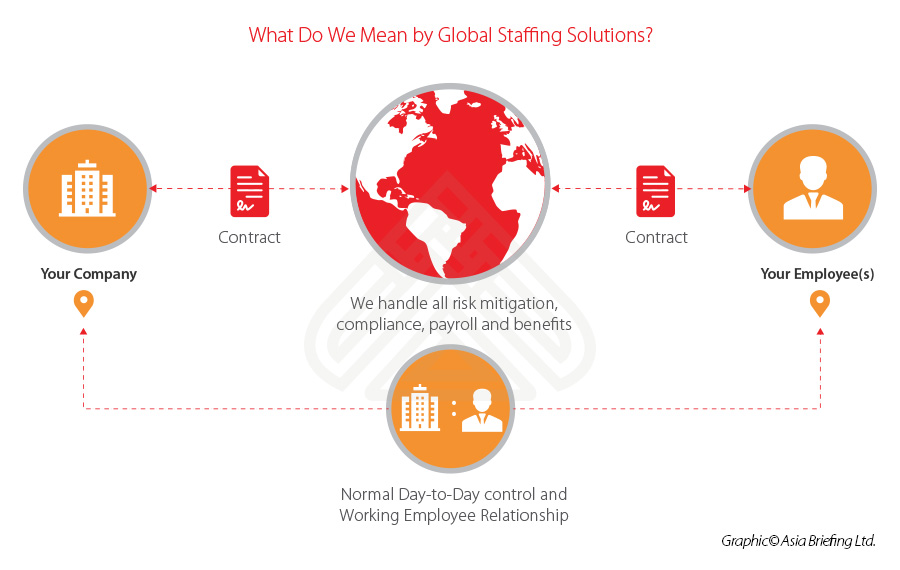Planning for Uncertainty: Global Staffing Solutions to Facilitate Your China Market Entry
By Sandy Zhang, Dezan Shira & Associates’ Shenzhen Office
Edited by: Dorcas Wong
For many businesses, setting up their own company, is the only known or viable way to enter a new market.
We have written frequently about the ways to best approach and leverage direct foreign investment models for market entry — such as establishing a company or a representative office in China. There may, however, be alternative ways to enter a market more nimbly, and with a smaller presence, that is worth consideration for an international SME.
Setting up a company typically requires months, during which time the company is not operational, and requires tens or hundreds of thousands of dollars in investment capital, often before understanding the business, financial, consumer, or local culture landscapes.
Such fixed entry strategies may result in mistakes such as: choosing the wrong pricing model, launching the wrong initial service line or product, setting up in the wrong location, pursuing a misguided business model, or selecting the wrong business partners or suppliers to work with.
Selecting well-known first-tier cities or jumping onto the promise of opportunities in tier-2, 3, and 4 cities, may not prove to have been the best choice.
It is easy to make avoidable mistakes in the absence of on-the-ground information and practical experience in the market. Yet reversing strategies when investments have been made is more costly, time-consuming, and can even adversely affect the business’s reputation.
Given these considerations, an increasing number of firms today may find it better to first test out or target a smaller or shorter-term presence in China. Fortunately, a lesser known model for businesses to hedge against the risks of market entry exists and is available across several Asian markets.
In this article, we introduce an alternative market entry mode, called Global Staffing Solutions.
Global Staffing Solutions: What is it and how does it work?
Global Staffing Solutions (GSS) is a market entry strategy that alleviates the stress on businesses to establish a corporate entity and outsources the burden of keeping up with the day-to-day management of an employee’s payroll and the entity’s tax compliance to a local firm. This frees up critical resources for the foreign firm to explore its options in a new or unfamiliar market.
In simple terms, the way GSS works is that it enables businesses to place boots on the ground, without needing to physically set up a local establishment. The service works with the third-party service provider signing separate contracts with both – the foreign company and the foreign employee.
This means that while the normal day-to-day control and working employee relationship will exist between the overseas company and its outsourced hires, the local service provider in China will handle all the risk mitigation, compliance, payroll, and benefits on the ground.
Advantages of adopting a global staffing solutions strategy
Under the GSS service, foreign companies can enjoy the benefits of hiring full-time staff working in overseas markets and remaining compliant with local laws, without the time and investment required to set up and operate an overseas legal entity.
Specifically, it can provide the following benefits to businesses.
-
Offshore recruitment before setting up an entity
GSS allows foreign companies to hire full-time local employees before setting up an entity in the target country. While the local-based employees are on the payroll of a third-party local company, they actually work for the foreign company. In this way, the local employees can conduct preliminary business research for the foreign company and test the waters in local markets.
-
Employing staff at local labor costs
Through GSS, the foreign company can easily hire employees at reasonable local wages, which avoids unnecessary costs caused by the lack of knowledge of local wage standards and wrong estimation of the manpower budget.
It also gives the opportunity to the foreign investor to test the local person and assess suitability for hire under a local permanent structure or, determine what additional skillset the “first” employee of the company should possess to deliver results in the country.
-
Outsourced employee management
Due to the labor relationship between the employees and the local provider, the HR team can assist the foreign employer with its salary calculations, social insurance contributions, individual income tax (IIT) declarations, and reimbursements for their local employees. The GSS service frees the foreign company from day-to-day HR and administration so that it can concentrate on its business activities.
-
Hiring foreign employees legally and in compliance
Quite a few foreigners and local staff continue to be hired “off the books” in China and are sent money from the overseas company directly into their local Chinese bank account – not only is this risky from a legal compliance perspective as there is no local social contribution or taxes paid, but it also does not provide the overseas investor with any leverage or legal control over such asset on the ground.
Under a GSS strategy, the local provider can ensure that the foreign employee remains compliant with China’s law and regulations, and proactively assist with the foreign employee’s visa and work permit application, setting up a bank account, as well as his/her IIT verification in China.
This has the added benefit of mitigating many of the legal and practical problems that arise when a payment is made into an employee’s overseas private bank account. With a GSS structure in place, the foreign employee can instead money directly from the local Chinese company to their local bank account in China.
-
Getting legal support on labor contract issues
Finally, the legal team in China can also assist with the establishment and determination of labor contracts with employees, according to local labor laws.
-
Flexibility in the working relationship
Foreign companies are able to terminate the local working relationship at a limited cost if there is a mismatch in skillsets or expectations. In the same vein, they can easily scale up their staffing solution if the working relationship is proven successful.
A case study: Overseas training company enters China
The following example illustrates how making use of global staffing solutions can assist businesses in practice.
Company A is a renowned training company that is considering an expansion into China. Though it has a well-established network overseas, its knowledge of the Chinese market is limited.
Spurred on by the size of the education industry and its high growth potential within China, Company A wishes to enter the market quickly but is hesitant to go through the official incorporation process without first testing the market out for itself.
Having completed an initial assessment of the market, Company A decides on Shenzhen as its first point of entry. As a frontier city in China’s reform and opening up, Shenzhen has not only some open and flexible economic policies, but also a large number of well-known Chinese enterprises, and many company headquarters have chosen to set up there.
Company A’s objective is to place some feet on the ground to build relationships with Chinese partners, and to gain some first-hand experience of the market.
Company A reaches out to its local professional services advisor, which in turn suggests their Global Staffing Solution to assist them with their pilot entry.
With the help of the professional services firm’s local resources, Company A was able to work out of a local firm in China, meet Chinese clients and partners, and gradually expand its market influence in China.
Eight months later, based on an optimistic evaluation of the Chinese market, Client A decided to set up its first company in China in Shenzhen.
This is one of many examples of how GSS can assist a company with its market entry. There are other ways in which GSS can be used by a company, such as:
- For the initial delivery of projects where the company cannot wait for the formal set-up before proceeding;
- Where a company wishes to mitigate the costly risk of prematurely investing in establishing and managing an overseas corporation until the timing is right; and
- If the company wants to onboard staff across Asian countries to grow a sustainable and compliant global presence but without maintaining ground operations across individual markets and dealing with the consequent HR admin hassles.
As a strategy, this can allow a company to test its market entry in one or more Asian countries, and then retain the option to easily scale back, switch to a different country, or upon proven success in a market – proceed to establish a formal presence there.
Maintaining an agile and resilient business model
Traditionally, a successful market entry strategy requires consideration of timing, scale relative to competition, and the ability to leverage complementary assets. However, in this new age of doing business, operational agility has now emerged as a key determinant of success.
In this way, businesses should be prepared to rapidly respond and adapt to changes in the market and environment in, both, productive and cost-effective ways. In terms of designing a market-entry strategy, this indicates a shifting focus to different markets, quickly and with minimal costs and risks.
Services, like Global Staffing Solutions, empower foreign firms with the ability to look at alternatives within a specific sector and try out different strategies or even markets in Asia to plan against supply chain disruptions and establish sustainable long-term operations.
More broadly, GSS provides an effective market entry strategy for companies looking to expand into fast-developing countries within Asia, such as Vietnam, Singapore, and Indonesia.
Investors can use this in a new market to gain first-hand knowledge of the local business environment and culture – to determine market suitability and formulate an appropriate entry strategy.
Uncertainty is an inevitable factor in doing business in any economic climate. Yet, businesses need to plan for the unexpected – disrupted global supply chains, destabilized economies, and/or mass lay-offs.
Businesses should not only be familiar with the market they wish to enter into but also keep an eye out for competing markets. Besides, they must be willing to test the market for themselves before making significant investments as they may not have the time or capital to engineer wholescale transformations to survive, which the ongoing pandemic has necessitated.
For more inquiries about preparing for your market entry into China, please contact us china@dezshira.com.
(This article was first published on July 6, 2020, and was last updated on November 6, 2023.)
About Us
China Briefing is one of five regional Asia Briefing publications, supported by Dezan Shira & Associates. For a complimentary subscription to China Briefing’s content products, please click here.
Dezan Shira & Associates assists foreign investors into China and has done so since 1992 through offices in Beijing, Tianjin, Dalian, Qingdao, Shanghai, Hangzhou, Ningbo, Suzhou, Guangzhou, Haikou, Zhongshan, Shenzhen, and Hong Kong. We also have offices in Vietnam, Indonesia, Singapore, United States, Germany, Italy, India, and Dubai (UAE) and partner firms assisting foreign investors in The Philippines, Malaysia, Thailand, Bangladesh, and Australia. For assistance in China, please contact the firm at china@dezshira.com or visit our website at www.dezshira.com.
- Previous Article China’s Human Genetic Resources Regulation: Key Points for Foreign Stakeholders
- Next Article China Releases New Measures to Further Open-Up its Free Trade Zones



























